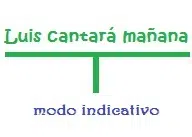Before entering fully into the meaning of the term indicative mode, we are going to proceed to know the etymological origin of the two words that give it shape:
-First of all, mode derives from Latin, specifically from “modus” which can be translated as “manner” or “measure”.
-Secondly, indicative also comes from Latin. In his case, it emanates from “indicativus”, which is synonymous with “that points”. A word that is the result of the sum of the following lexical components: the prefix “in-”, which means “inwards”; the verb “dicare”, which is equivalent to “pointing with the finger”; and the suffix “-tive”, which is used to indicate “passive or active relationship”.
The term mode has several uses. On this occasion we are going to focus on its meaning in the field of grammar , where it is linked to a feature that acts within the framework of the conjugation of verbs to refer to a syntactic dependency or refer to the attitude of the individual towards what is expressed. .
 There are different types of modes. There are the subjunctive, the imperative and the indicative. Thus, the first comes to indicate an expression of desire or doubt while the second comes to establish an expression of command.
There are different types of modes. There are the subjunctive, the imperative and the indicative. Thus, the first comes to indicate an expression of desire or doubt while the second comes to establish an expression of command.
The indicative mood is one that allows us to indicate that what is said in the predicate is real or is taken as true.
Used in different languages , the indicative mood is opposite to the moods that express expected, desired or probable events. Whether orally or in the written language, the indicative mood is usually among the most used.
Let's analyze an example : “Luis will sing tomorrow.” As you can see, this phrase ensures that the individual in question, at some point the next day, will dedicate himself to singing. It is not a wish or a possibility: it is stated that “Luis will sing.” That is why the indicative mood is used.
“My uncle lives next door” is another sentence in the indicative mood. The speaker reports that his “uncle” resides in the house “next door” , leaving no room for doubt.
The indicative mood also allows the development of statements in the past tense. “Lionel Messi scored three goals in yesterday's match” is an expression that reveals that the Argentine soccer player scored three times in a match played the previous day.
Specifically, in addition to everything stated above, we cannot ignore that there are five different types of what the indicative mood is. Specifically, these are the following five tenses: conditional, present, future imperfect, past perfect simple and past imperfect.
If we use, for example, the verb to love in the first person singular, these would be the aforementioned five modes:
-The conditional would be “I would love.”
-The present becomes “I love”.
-The imperfect future would be “I will love.”
-The past perfect simple becomes “I loved.”
-The imperfect tense is about “I loved.”
